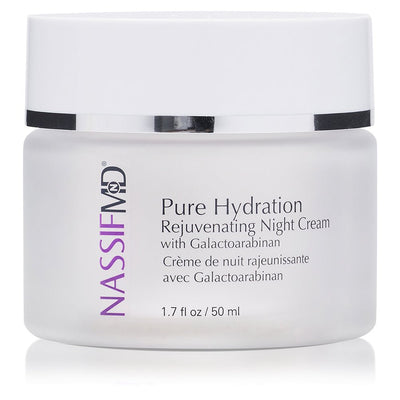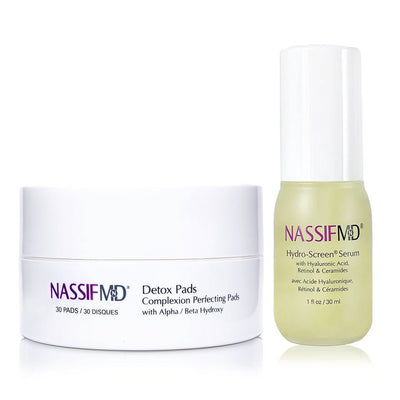What is Hyaluronic Acid, and Why is it in So Many Skincare Products?
Hyaluronic acid is a skincare ingredient in high demand. A hyaluronic acid-containing product is a must-have in your skincare routine, and for good reasons: it hydrates, firms, plumps, and protects the skin. It has a high safety profile because it’s naturally made in the body.
After reading this article, you’ll be ready to give up your dry skin moisturizers and other products that don’t seem to work in favor of a hyaluronic acid serum.
Please keep reading to learn more about:
- What is hyaluronic acid?
- What is hyaluronic acid good for?
- Benefits of hyaluronic acid
- Who can use hyaluronic acid?
What is Hyaluronic Acid?
Hyaluronic acid is a natural glycosaminoglycan molecule produced by the body. You’ll find it throughout the body in connective tissues, neural tissues, joints, eyes, and skin. Most hyaluronic acid in the body concentrates in the skin. It’s involved in many processes, including embryo development, inflammation, and wound healing.
The discovery of hyaluronic acid’s hydrating and anti-aging properties has led to many uses in the medical field. In dermatology and cosmetology, you’ll find hyaluronic acid in hydrating skin products, including serums, injectables, masks, moisturizers, and more.
Even though “acid” is in the name, don’t mistake hyaluronic acid for an exfoliating product like alpha or beta hydroxy acids. Hyaluronic acid in skincare has hydrating benefits that we’ll discuss more shortly. One research article describes hyaluronic acid as one of the “most efficient and safe ingredients used frequently in cosmetics.”
Water-Binding Molecule
Hyaluronic acid turns wrinkled skin into hydrated skin because of its water-binding properties. It’s considered a humectant, a substance that holds onto water. Hyaluronic acid attracts water and holds water molecules, locking the water in the deeper layers of the skin.
In addition, topical hyaluronic acid helps to balance fluids inside the cell with fluids outside the cell, resulting in better tissue hydration.
Decreases in Aging Skin
Like other essential skin molecules, including collagen and elastin, hyaluronic acid production decreases with age. This loss contributes to dry, wrinkly skin. Increasing the hyaluronic acid in the skin improves hydration, promotes skin regeneration, and improves the appearance of fine lines and wrinkles.
What Are the Benefits of Hyaluronic Acid
When considering how to hydrate skin, hyaluronic acid has many benefits. Let’s look at some hyaluronic acid benefits when used in topical skincare products.
Hydrates Skin
When skin becomes dehydrated, it loses its form, volume, and moisture content, influencing how the face looks. Hyaluronic acid has the unique ability to bind to water, improving form, volume, and hydration. It’s no wonder that one of the main hyaluronic acid serum benefits is skin hydration.
Protects Skin Barrier
The skin barrier refers to the epidermal layer of the skin that creates the barrier between your body and the environment. Dysfunction of the skin barrier relates to dermatological issues, such as atopic dermatitis (eczema) and signs of aging.
Dry skin may be primarily an issue of suboptimal skin barrier integrity, which leads to transepidermal water loss (TEWL), the evaporation of water from the skin. Hyaluronic acid supports skin barrier repair and slows TEWL, leading to more hydrated, plump, and healthy skin.
When considering how to protect the skin barrier, look for hyaluronic acid as an ingredient in your serum. Other skincare ingredients that support healthy skin barrier function include ceramides and retinol.
Improves Skin with Lines and Wrinkles
Hyaluronic acid stimulates collagen and elastin production. Collagen is a protein that builds skin structure, while elastin is a protein that allows the skin to stretch or move and then bounce back into place. Increased collagen and elastin improve skin structure, elasticity, and supports facial rejuvenation. The result is hydrated, plumper, and firmer skin, with fewer fine lines and wrinkles.
Who Can Use Hyaluronic Acid?
Hyaluronic acid is a versatile ingredient found in various skincare products that target different skin types and skin health concerns. Hyaluronic acid improves skin hydration and is an effective moisturizing skin solution.
Works with All Skin Types
The word “acid” may sound off-putting and like a harsh ingredient. However, don’t let the name fool you. Hyaluronic acid is very gentle. It’s non-irritating and works for all skin types, including sensitive or acne-prone skin. Hyaluronic acid is well tolerated, and because it’s a natural component of skin, it doesn’t trigger allergic reactions. If you react to a product containing hyaluronic acid, the response is likely due to another ingredient.
Most Effective on Aging Skin
Hyaluronic acid is foundational in anti-aging skin care. Because hyaluronic acid production decreases with age, its loss contributes to the loss of hydration, volume, and skin integrity in aging skin.
Topical hyaluronic acid has many benefits for aging skin, including reducing fine lines on the skin, improving skin hydration, and skin rejuvenation. Combining hyaluronic acid with other anti-aging, synergistic ingredients is a key component in skin care for wrinkles.
NassifMD® Hydro-Screen Serum is an effective moisturizer for dry skin, aging skin, and all skin types. It hydrates, moisturizes, repairs, and restores the skin. It boosts collagen and elastin production, producing a long-term solution for skin health.
This hydrating serum with hyaluronic acid contains hyaluronic acid, ceramides, lipids, and retinol to synergistically support skin barrier function, hydration, and rejuvenation.
Use NassifMD® Hydro-Screen Serum twice daily, morning and night, after cleansing. Apply when the skin is damp (or after a toner) to allow the hyaluronic acid to pull more moisture into the skin. Then, lock in the serum with a moisturizer. During the day, follow with an SPF moisturizer under your makeup. At night, you can practice skin slugging for even more hydrating benefits.
If you don’t already use hyaluronic acid as part of your skincare routine, now is the time to make it a staple step. Try it and notice plumper, firmer, more hydrated skin with fewer wrinkles, crepey skin, and dryness!
References
- Juncan, A. M., Moisă, D. G., Santini, A., Morgovan, C., Rus, L. L., Vonica-Țincu, A. L., & Loghin, F. (2021). Advantages of Hyaluronic Acid and Its Combination with Other Bioactive Ingredients in Cosmeceuticals.Molecules (Basel, Switzerland), 26(15), 4429.
- Bukhari, S. N. A., Roswandi, N. L., Waqas, M., Habib, H., Hussain, F., Khan, S., Sohail, M., Ramli, N. A., Thu, H. E., & Hussain, Z. (2018). Hyaluronic acid, a promising skin rejuvenating biomedicine: A review of recent updates and pre-clinical and clinical investigations on cosmetic and nutricosmetic effects.International journal of biological macromolecules, 120(Pt B), 1682–1695.
- Wang, S. T., Neo, B. H., & Betts, R. J. (2021). Glycosaminoglycans: Sweet as Sugar Targets for Topical Skin Anti-Aging.Clinical, cosmetic and investigational dermatology, 14, 1227–1246.
- Yoshida, T., Beck, L. A., & De Benedetto, A. (2022). Skin barrier defects in atopic dermatitis: From old idea to new opportunity.Allergology international : official journal of the Japanese Society of Allergology, 71(1), 3–13.
- Shin, J. W., Kwon, S. H., Choi, J. Y., Na, J. I., Huh, C. H., Choi, H. R., & Park, K. C. (2019). Molecular Mechanisms of Dermal Aging and Antiaging Approaches.International journal of molecular sciences, 20(9), 2126.
- Bravo, B., Correia, P., Gonçalves Junior, J. E., Sant'Anna, B., & Kerob, D. (2022). Benefits of topical hyaluronic acid for skin quality and signs of skin aging: From literature review to clinical evidence.Dermatologic therapy, 35(12), e15903.






















